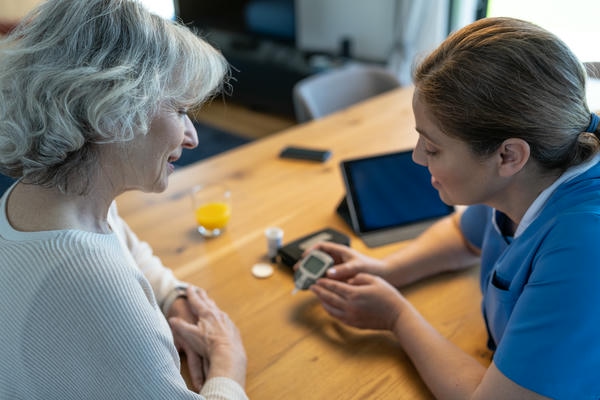Imagine waking up every morning, knowing that your loved one relies on you for their daily health and well-being. For many caregivers, this scenario is not just a duty but a heartfelt commitment, especially when someone with diabetes care requirement. Diabetes, a chronic condition affecting millions worldwide, requires constant vigilance and support to manage effectively.
Understanding Diabetes: A Journey of Challenges and Triumphs
Diabetes isn’t just about sugar levels; it’s a journey marked by highs and lows, both literally and figuratively. Whether it’s type 1, type 2, or gestational diabetes, each variant presents its own set of challenges. Take type 1 diabetes, for example—it’s like a daily balancing act, where insulin doses, blood sugar checks, and meal planning are your routine.
The Role of Caregivers in Diabetes Management: Navigating the Daily Maze
1. Medication Management and Adherence: Keeping the Rhythm
Every day starts with ensuring medications are administered on time. For caregivers, this means not just handing over pills but understanding the importance of each dose. Insulin injections for type 1 diabetes are crucial—timing is everything. It’s about being there, knowing the right dose, and making sure it’s delivered without fail.
2. Blood Sugar Monitoring: The Numbers Game
Testing blood sugar levels isn’t just about numbers; it’s about peace of mind. Caregivers play a vital role in this daily ritual—checking blood sugar levels, interpreting results, and adjusting care plans accordingly. Imagine the relief when those numbers stabilize, indicating that today’s regimen is on track.
3. Nutritional Guidance: Nourishing the Body and Soul
Food isn’t just sustenance; it’s a cornerstone of diabetes management. Caregivers work hand-in-hand with nutritionists to craft meal plans that balance taste with health. It’s about ensuring every meal supports stable blood sugar levels, providing the right nutrients without sacrificing flavor or enjoyment.
4. Physical Activity Support: Moving Towards Wellness
Exercise isn’t just about staying fit; it’s a lifeline for managing diabetes. Caregivers encourage daily movement, whether it’s a walk in the park or gentle yoga at home. It’s about understanding physical limits, ensuring safety, and celebrating each step towards better health.
5. Education and Empowerment: Knowledge is Power
Diabetes isn’t a journey you navigate alone. Caregivers empower their loved ones with knowledge—attending medical appointments, asking questions, and learning about treatment options. It’s about understanding the condition, knowing the signs of trouble, and feeling confident in managing diabetes together.
6. Emotional Support and Well-being: Heartfelt Connections
Behind every blood sugar check and insulin dose is a caregiver providing unwavering support. It’s about being there through the highs and lows, offering empathy, and cheering on small victories. Diabetes isn’t just a physical challenge; it’s an emotional journey, and caregivers play a crucial role in providing reassurance and strength.
7. Monitoring and Reporting: Guardians of Health
Caregivers are the frontline defenders of health, monitoring symptoms, and reporting any changes to healthcare providers. It’s about keeping meticulous records—blood sugar readings, medication logs, and daily observations. Imagine the relief of catching early signs of trouble and knowing help is just a call away.
Challenges and Solutions in Diabetes Care: Weathering the Storms
Managing diabetes isn’t without its challenges—adherence to treatment plans, navigating potential complications, and the emotional toll on families. Yet, with patience, understanding, and access to resources, caregivers can overcome these obstacles and ensure their loved ones receive the best possible care.
Utilizing Technology and Resources: Tools of Tomorrow
Technology has transformed diabetes management, offering tools like continuous glucose monitors and telemedicine for remote consultations. Caregivers harness these innovations to monitor health, communicate with healthcare teams, and empower their loved ones to take charge of their diabetes journey.
Self-Care for Caregivers: Nurturing the Heart
Caring for someone with diabetes requires caregivers to prioritize their own well-being. It’s about finding balance—seeking support from others, taking breaks, and practicing self-care. After all, caring for others starts with caring for oneself.
Conclusion: A Journey of Compassion and Commitment
In conclusion, caregiving isn’t just a role—it’s a journey of compassion, dedication, and unwavering support. By understanding the unique challenges of diabetes and embracing their role as caregivers, individuals can make a profound difference in the lives of those they care for. Together, we navigate the complexities of diabetes management, celebrating victories, and supporting one another through every step of the journey.













